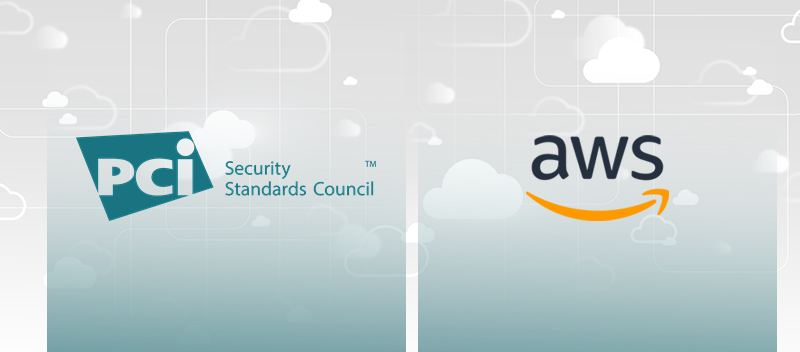Blog What is AWS PCI Compliance?
What is AWS PCI Compliance?

If your business handles payment card data, you need to be familiar with PCI DSS compliance. But what exactly is this standard, and why is it so important? The Payment Card Industry Data Security Standard (PCI DSS) is a set of security guidelines designed to ensure that businesses securely handle credit card information.
It might sound complicated, but understanding and following these standards is crucial for safeguarding your customers’ data and maintaining their trust. Let’s dive into how Amazon Web Service (AWS) helps businesses meet these essential requirements.
Understanding PCI DSS Requirements
The PCI DSS standard is comprised of six main objectives that outline best practices for securing payment card data:
- Build and Maintain a Secure Network: This includes installing and maintaining a firewall configuration to protect cardholder data.
- Protect Cardholder Data: Encrypt transmission of cardholder data across open, public networks.
- Maintain a Vulnerability Management Program: Use and regularly update anti-virus software.
- Implement Strong Access Control Measures: Restrict access to cardholder data by business need-to-know.
- Regularly Monitor and Test Networks: Track and monitor all access to network resources and cardholder data.
- Maintain an Information Security Policy: Ensure the policy addresses information security for employees and contractors.
Cardholder Data Environment and Scope
Understanding the “Cardholder Data Environment” (CDE) is crucial. The CDE encompasses the people, processes, and technology involved in storing, processing, or transmitting cardholder data. Essentially, it’s the space where sensitive card data resides, and it must be secured according to PCI DSS guidelines.
Responsibilities of Merchants and Service Providers
Both merchants and service providers share the responsibility of adhering to PCI DSS standards:
- Merchants: These are businesses accepting credit card payments. They must ensure their systems and processes comply with PCI DSS, including regular assessments and security measures.
- Service Providers: These include any third-party entities that handle cardholder data on behalf of merchants. They also need to adhere to PCI compliance and often play a significant role in the overall security posture of the payment processing system.
By understanding and implementing these requirements, both merchants and service providers can significantly reduce the risk of data breaches and ensure they are protecting their customers’ sensitive information effectively.
For more on our PCI DSS compliance services, Click Here
AWS Services for PCI Compliance
AWS provides a robust set of security features that help you meet PCI DSS requirements. These include:
- Identity and Access Management (IAM): Control who can access your AWS resources and under what conditions.
- Encryption: AWS offers various encryption options for data at rest and in transit, ensuring sensitive data is protected.
- Firewalls and Security Groups: These tools help create a secure network environment, safeguarding cardholder data from unauthorized access.
AWS Security Assurance Services
To further support your compliance efforts, AWS offers Security Assurance Services. These services help ensure that your AWS environment complies with industry standards and best practices:
- AWS Artifact: This is your go-to resource for on-demand access to AWS compliance reports and select online agreements.
- AWS Shield: A managed DDoS protection service that safeguards applications running on AWS.
- AWS WAF (Web Application Firewall): Protects your web applications from common web exploits that could affect availability, compromise security, or consume excessive resources.
AWS Security Hub and AWS Audit Manager
Two key services that can simplify your compliance journey are AWS Security Hub and AWS Audit Manager:
- AWS Security Hub: This service provides a comprehensive view of your security state within AWS. It helps you check your environment against the best practices and industry standards, including PCI DSS.
- AWS Audit Manager: Streamline your audit preparation by automating evidence collection and managing assessments across your AWS accounts. This ensures you’re always ready for audits and can easily demonstrate compliance with PCI DSS.
Securing the AWS Cloud Environment
Making sure your AWS cloud environment is secure is crucial for maintaining PCI compliance.
— AWS Identity and Access Management (IAM)
IAM allows you to control who has access to your AWS resources. It’s like giving out keys to specific doors in a building, only instead of doors, it’s your cloud resources. Here’s what you can do with IAM:
- Create and manage users and groups: Assign permissions to each user or group based on their role.
- Fine-grained permissions: You can specify exactly which actions a user or service can perform, down to the API call level.
- Multi-Factor Authentication (MFA): Add an extra layer of security to your accounts by requiring users to provide a second form of authentication.
— AWS Key Management Service (KMS) and AWS CloudHSM
- AWS KMS: This service makes it easy to create and control the encryption keys used to protect your data. It’s integrated with other AWS services, so you can start encrypting your data quickly and efficiently.
- AWS CloudHSM: If you need even more control over your encryption keys, CloudHSM provides dedicated hardware security modules. This is especially useful for organizations with stringent regulatory requirements.
— Network Security with AWS Network Firewall and AWS Firewall Manager
- AWS Network Firewall: This is a managed service that makes it easy to deploy essential network protections for your virtual private clouds (VPCs). It includes features like stateful firewall rules and intrusion prevention systems.
- AWS Firewall Manager: This service simplifies administration and maintenance of firewall rules across multiple accounts and resources. It ensures that your network security policies are consistently applied everywhere they need to be.
Data Protection and Encryption
When we talk about encryption, we’re referring to two main types: encryption of data at rest and encryption of data in transit.
- Data at Rest: This means encrypting data stored on disks or databases. Think of it as locking away your treasures in a safe.
- Data in Transit: This involves encrypting data as it travels over the internet or internal networks. Imagine sending an important letter in an envelope that only the intended recipient can open.
AWS makes both of these processes straightforward by offering various encryption options for your data storage and transfer needs, ensuring that your sensitive data remains secure whether it’s sitting in a database or traveling to another server.
Segmentation and Isolation of Cardholder Data Environment
Segmentation and isolation are critical practices when dealing with cardholder data. By segregating your cardholder data environment (CDE) from other parts of your network, you reduce the scope of PCI DSS compliance and minimize security risks.
Here’s how AWS helps with this:
- Virtual Private Cloud (VPC): AWS VPC lets you launch AWS resources in a logically isolated virtual network that you define. This helps you separate your CDE from other environments.
- Security Groups and Network ACLs: These tools allow you to control inbound and outbound traffic to your resources, ensuring that only authorized systems can communicate with your CDE.
Monitoring and Logging
AWS offers several powerful tools to help you monitor and log all activities.
AWS CloudTrail for Auditing and Logging
CloudTrail records all API calls made within your AWS account, providing a complete history of user activity and API usage.
- Audit Trails: CloudTrail helps you track changes and access patterns, making it easier to detect suspicious activities.
- Compliance Reporting: The service provides detailed logs that can be used for regulatory compliance and audit requirements.
- Security Analysis: You can analyze the logs to identify potential security risks and take corrective actions promptly.
AWS Config for Resource Configuration Management
This service continuously monitors and records your AWS resource configurations, allowing you to assess, audit, and evaluate the configurations of your resources.
- Configuration History: AWS Config keeps a detailed history of all changes to your AWS resources, helping you understand how your environment has evolved over time.
- Compliance Checks: You can set up custom rules to check the compliance of your resource configurations against industry best practices and internal policies.
- Resource Relationships: AWS Config visualizes relationships between resources, making it easier to identify dependencies and potential impact areas during changes.
AWS Security Hub for Continuous Monitoring
Security Hub integrates with various AWS services to provide a comprehensive view of your security posture across your AWS accounts.
- Centralized Security View: Security Hub aggregates security findings from multiple AWS services and third-party solutions into a single dashboard.
- Automated Security Checks: The service performs continuous automated checks against security best practices, industry standards, and compliance frameworks like PCI DSS.
- Prioritization and Remediation: Security Hub helps you prioritize security issues based on severity and provides actionable insights to remediate them quickly.
Automating PCI Compliance on AWS
Automating compliance tasks can save you a lot of time and reduce the risk of human error. Fortunately, AWS offers several tools to help you automate various aspects of PCI compliance.
AWS Systems Manager for Patch Management and Configuration
First up is AWS Systems Manager. This service aids in the effective and safe management of your AWS resources.
- Patch Management: Systems Manager automates the process of patching your instances, ensuring that your systems are always up-to-date with the latest security patches.
- Configuration Management: You can use Systems Manager to automate the configuration of your instances. This includes setting up software, managing operational tasks, and applying consistent configurations across your environment.
- Centralized Operations: The Systems Manager console provides a single interface to view and manage your AWS resources, making it easier to stay on top of compliance requirements.
AWS License Manager for Software License Tracking
Next is the AWS License Manager. Managing software licenses can be a headache, but AWS License Manager simplifies this process.
- License Tracking: License Manager helps you track and manage your software licenses, ensuring you remain compliant with vendor agreements.
- Policy Enforcement: You can set up rules to enforce license usage policies, preventing over-deployment and reducing the risk of non-compliance.
- Cost Optimization: By keeping track of your licenses, you can avoid unnecessary expenditures on unused or mismanaged software licenses.
AWS Audit Manager for Streamlining Audits
Finally, there’s AWS Audit Manager. With the help of this service, you may streamline the audit procedure and make sure you’re always prepared for compliance evaluations.
- Automated Evidence Collection: Audit Manager automatically collects evidence required for audits, such as configuration data and logs. This saves you from manual data gathering and ensures accuracy.
- Assessment Frameworks: The service comes with pre-built frameworks for various compliance standards, including PCI DSS.
- Continuous Monitoring: Audit Manager continuously monitors your environment, helping you maintain compliance over time and providing peace of mind that you’re always audit-ready.
Best Practices and Resources
The AWS Security blog and whitepapers are excellent sources for staying updated on security best practices and guidelines.
- Security Blog: Regular updates with practical advice and real-world use cases.
- Whitepapers: In-depth documents covering specific security aspects and PCI DSS implementation.
– Engaging with AWS Professional Services
AWS Professional Services provides expert guidance to help you design and manage PCI-compliant environments.
- Expert Assistance: Tailored support for meeting PCI requirements.
- Customized Solutions: Optimizing both new and existing environments for compliance.
– Partnering with AWS Partners and PCI DSS Experts
Collaborate with AWS Partners and PCI DSS experts to enhance your compliance efforts.
- AWS Partners: Access specialized tools and consulting services.
- PCI DSS Experts: Receive thorough assessments and navigate audits confidently.
– Leveraging AWS Compliance Tools
Utilize AWS tools to manage and monitor your compliance status effectively:
- Amazon GuardDuty: Monitors for unauthorized or malicious activity.
- AWS Artifact: Access compliance reports and documentation.
- Amazon Inspector: Automated security breach scans and prioritization.
- Compliance Workbook: Sample architectures and guides for PCI-compliant environments.
Achieving and Maintaining PCI DSS Compliance on AWS
Securing PCI DSS compliance on AWS offers numerous advantages:
- Enhanced Security: AWS provides robust security features, ensuring your cardholder data is protected from threats.
- Scalability and Flexibility: Easily scale your infrastructure while maintaining compliance.
- Cost Efficiency: Efficient resource management helps reduce costs associated with compliance.
By being PCI DSS compliant on AWS, you can confidently secure your payment card data and streamline your path to PCI DSS compliance.
Ready to achieve PCI DSS compliance on AWS with TrustNet’s expert guidance? Contact Our Experts today.




